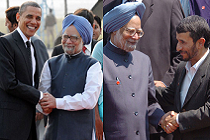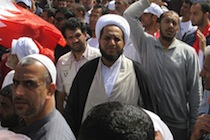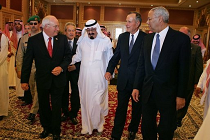Is this my Syria?
A former Syrian radio show host currently residing in the U.S. blogs to Syrians and world leaders alike to put an end to the crisis and to create a new and better Syria.

A former Syrian radio show host currently residing in the U.S. blogs to Syrians and world leaders alike to put an end to the crisis and to create a new and better Syria.
 Courtesy: U.S. Department of Defense
Courtesy: U.S. Department of Defense
An important take-away from the preliminary pact reached by Kabul and Washington is that unlike the 1990s, the Americans are not just packing their bags and leaving. This is good news in terms of regional stability, and the upcoming NATO summit may answer some questions this draft agreement raises.
What are the implications for India if Iran is attacked? How effective has the response been by gulf nations to their own protests? Ambassador Talmiz Ahmad, India’s former Ambassador to Saudi Arabia, discusses the dynamics of West Asia with Gateway House’s Alisha Pinto and Azadeh Pourzand.
The scope for any process on nuclear talks with Iran to founder on distrust, misunderstanding and political in-fighting in both Tehran and Washington remains formidable. Equally disturbing are the wider political realities. Can the upcoming talks in Istanbul launch a process that can, over time, lead to agreement?
 Courtesy: PMO
Courtesy: PMO
Although political discourse around Iranian sanctions is binary and stark in Washington, the reality of India's actions within its bilateral framework with Iran is complex. India is engaged in an excruciating tightrope walk, and has to defend its choices and compulsions with ardour.
Given the immediacy of rising tensions around Iran’s nuclear programme, what can India and the U.S. do to resolve the issue? Gateway House’s Manjeet Kripalani talks to Ambassador Frank Wisner about the possibilities of a strike against Iran and its effects on the India-U.S. relationship.
 Courtesy: freeedomania/Flickr
Courtesy: freeedomania/Flickr
As the al-Assad regime faces increasing international pressure to step down from power, Syrian President Bashar al-Assad attempted to make political reforms recently. However, Syria has strong relations within West Asia and the denouement will profoundly impact developments in this region.
 Courtesy: Al Jazeera English/Flickr
Courtesy: Al Jazeera English/Flickr
The author outlines the partnership between NATO and Wahhabi extremists, and how the West assisted in an armed Sunni movement, which has spread to many countries in West Asia. Consequently, the Shia population suffers from serious discrimination at the hands of Wahabbi.
 Courtesy: UN Photo/Paul Banks
Courtesy: UN Photo/Paul Banks
After the crass misuse of Responsibility to Protect (R2P) in Libya, the broader question is: where is R2P headed? Do the events in Libya herald a more explicit assertion of this doctrine in other parts of the world? And should India rethink its viewpoint towards this ambiguous doctrine?
 Courtesy: White House photo/WikimediaCommons
Courtesy: White House photo/WikimediaCommons
The Wahhabis, who now merit NATO backing, continue on their global mission of converting the Muslim Ummah to its relatively harsh and antediluvian ways of thinking and living. For NATO, this is a geopolitical miscalculation that will have tragic security consequences for the alliance within a decade.